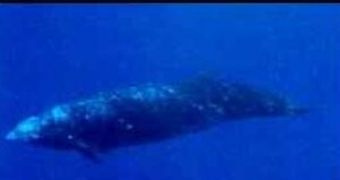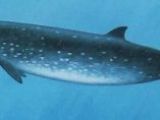Beaked whales represent a family of toothed cetaceans (so more related to dolphins than to true whales) amongst the least known mammalian family. They measure between 3,4 to 12 m length and weigh 1 to 15 tones.
They live in deep sea only and feed on sea floor by suction feeding, without using their teeth (which are in fact deeply reduced in number and size). They are known to perform long divings, but their remote habitat impedes scientists to achieve much information about their biology.
An international team studying diving capacity of two beaked whales species, Cuvier's beaked whale (Ziphius cavirostris) (photo above) and Blainville's beaked whale (Mesoplodon densirostris) (image bellow), discovered that these species achieve the deepest and longest dives of any air-breathing species.
Scientists were intrigued, because beaked whales stranded during naval sonar exercises presented symptoms of decompression sickness. The team wanted to see if the wales' extreme dives put them at risk from naval sonar exercises. Researchers used digital archival tag (D-tag), about the size of a sandal, which have a variety of recording sensors for sounds and movements, and is attached to the animals with four small suction cups using a pole. The D-tags released from the animals in a day are recovered and the stored data is analyzed.
"These two beaked whale species make long, very deep dives to find food, and then make shallow dives and rest near the surface. By contrast, sperm whales and elephant seals can make a series of deep dives without the need for prolonged intervals between deep dives. We think that beaked whales return to the surface after deep dives with an oxygen debt and need to recover before their next deep dive." said Dr. Peter Tyack from Woods Hole Oceanographic Institution (WHOI).
The analysis would indicate that beaked whales' deep diving does not provoke decompression symptoms. "Rather, it appears that their greatest risk of decompression sickness would stem from an atypical behavioral response involving repeated dives at depths between 30 and 80 meters (roughly 100 to 250 feet), " Tyack said.
"The reason for this is that once the lungs have collapsed under pressure, gas does not diffuse from the lungs into the blood. Lung collapse is thought to occur shallower than 100 meters (330 feet), so deeper parts of the dive do not increase the risk of decompression problems. However, if beaked whales responded to sonars with repeated dives to near 50 meters (165 feet), this could pose a risk."
The Cuvier's beaked whales were tagged in the Ligurian Sea off Italy, while the Blainville's beaked whales were tagged off the Canary Islands in deep water, between 700 and 2,000 meters (2,300 to 6,500 feet) with steep bottom topography. "Shallow dives seem to be performed between deep dives, and both species dive very deep to hunt for prey. They seem to spend equal time ascending and descending in shallow dives, but take longer to ascend from deep dives." Tyack said. "Avoidance of decompression problems by slow ascent, as in scuba divers, cannot account for this behavior if the lungs of these breathhold diving marine mammals are collapsed at depths greater than 100 meters (330 feet)."
Beaked whales are very little known because they spend little time at the surface and are difficult to tag. The better studied sperm whale can dive for more than one hour to depths greater than 1,200 meters (roughly 4,000 feet), with average dives of 45 minutes to depths of 600-1,000 meters (1,968 to 3,280 feet).
Elephant seals can spend up to two hours in depths over 1,500 meters (nearly 5,000 feet), but average dives last only 25-30 minutes to depths of about 500 meters (1,640 feet).
Cuvier's beaked whales dove to maximum depths of nearly 1,900 meters (about 6,230 feet) with a maximum duration of 85 minutes, while the Blainville's dove to a maximum depth of 1,250 meters (4,100 feet) and 57 minutes in duration. So, the Cuvier's beaked whale holds the record for the deepest dive confirmed of any air-breathing animal. But the average of the deep foraging dives describes best the diving capacity of a species.
The average foraging dive for Cuvier's beaked whale went to a depth of 1,070 meters (about 3,500 feet) with a duration of 58 minutes, while the Blainville's beaked whales dove to an average depth of 835 meters (2,740 feet) and 46.5 minutes in duration.
These represent the deepest and longest average dives reported for any air breathing diving animal. Regular echolocation clicks, buzzes and echoes of what appears to be prey were recorded on the tags, suggesting the whales were hunting for food on the deep dives. As these beaked whale species are reported to mass strand during naval sonar exercises in the area, scientists want to decode how the whales respond to the sonar sounds and which way the sonars increase the risk of stranding them. "No matter what the precise cause of the strandings is, we need to develop effective mitigation strategies to reduce the accidental exposure of beaked whales to bay sonar," Tyack said.

 14 DAY TRIAL //
14 DAY TRIAL // 
